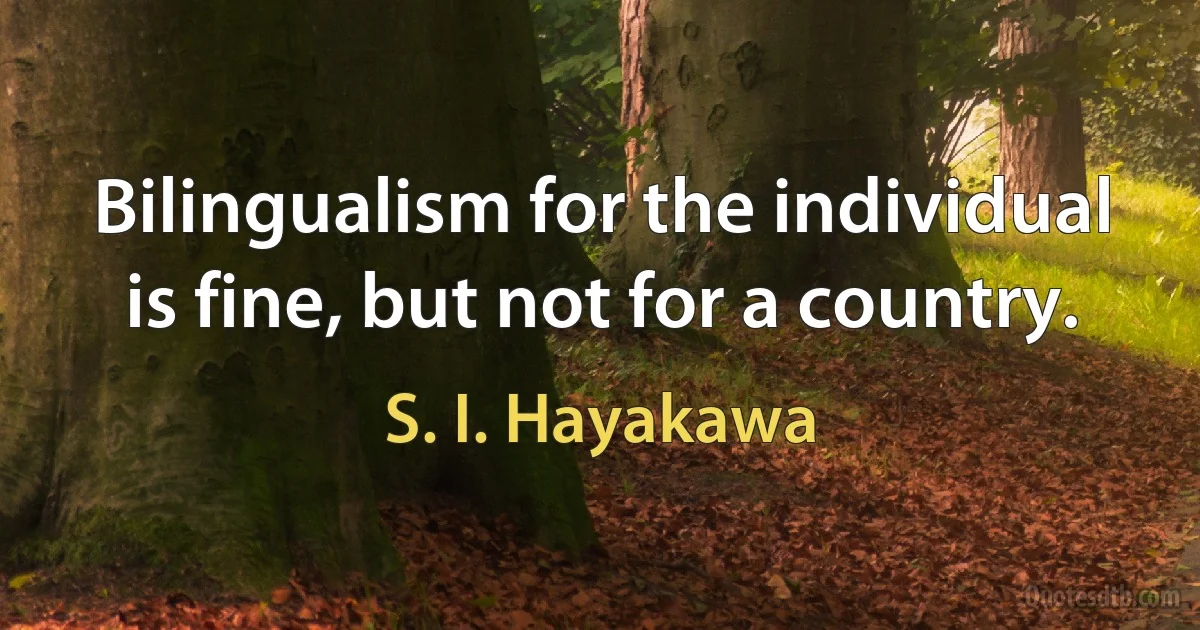S. I. Hayakawa quotes - page 2
From the moment he switches on an early-morning news broadcast until he falls asleep at night over a novel or a magazine, he is, like all other people living in modern civilized conditions, swimming in words. Newspaper editors, politicians, salesmen, disc jockeys, columnists, luncheon club speakers, and clergymen; colleagues at work, friends, relatives, wife and children; market reports, direct-mail advertising, books, and billboards -- all are assailing him with words all day long. [...].

S. I. Hayakawa
Such complicated and apparently unnecessary behavior leads philosophers, both amateur and professional, to ask over and over again, "Why can't human beings live simply and naturally?" Often the complexity of human life makes us look enviously at the relative simplicity of such lives as dogs and cats lead. But the symbolic process, which makes possible the absurdities of human conduct, also makes possible language and therefore all the human achievements dependent upon language. The fact that more things can go wrong with motorcars than with wheelbarrows is no reason for going back to wheelbarrows. Similarly, the fact that the symbolic process makes complicated follies possible is no reason for wanting to return to a cat-and-dog existence. A better solution is to understand the symbolic process so that instead of being its victims we become, to some degree at least, its masters.

S. I. Hayakawa
Language, that is to say, is the indispensable mechanism of human life -- of life such as ours that is molded, guided, enriched, and made possible by the accumulation of the past experience of members of our own species. Dogs and cats and chimpanzees do not, so far as we can tell, increase their wisdom, their information, or their control over their environment from one generation to the next. But human beings do. The cultural accomplishment of the ages, the invention of cooking, [...] and the discovery of all the arts and sciences come to us as free gifts from the dead. These gifts, which none of us has done anything to earn, offer us not only the opportunity for a richer life than our forebears enjoyed but also the opportunity to add to the sum total of human achievement by our own contributions, however small they may be.

S. I. Hayakawa
Mr. Mets is representative not only of the general public, but also of many scientific workers, publicists, and writers. Like most people, he takes words as much for granted as the air he breathes, gives them about as much thought. [...] But Mr. Mets, like the rest of us, also adjusts himself automatically to changes in the verbal climate, from one type of discourse to another, from one set terms to another, from the listening habits of one kind of social occasion to those of another kind of social occasion, without conscious effort. He has yet, however, to acknowledge the effect of his verbal climate on his mental health and well-being.

S. I. Hayakawa
Whether he realizes it or not, however, Mr. Mets is affected every hour of his life not only by the words he hears and uses, but also by his unconscious assumptions about language. [...] Such unconscious assumptions determine the effect that words have on him -- which in turn determines the way he acts, whether wisely or foolishly. Words -- the way he uses them and the way he takes them when spoken by others -- largely shape his beliefs, his prejudices, his ideals, his aspirations. They constitute the moral and intellectual atmosphere in which he lives -- in short, his semantic environment.

S. I. Hayakawa
All fashionable clothes, as Thorstein Veblen has pointed out in his Theory of the Leisure Class (1899), are highly symbolic: materials, cut, and ornament are dictated only to a slight degree by consideration of warmth, comfort, or practicability. The more we dress up in fine clothes, the more we restrict our freedom of action. But by means of delicate embroideries, easily soiled fabrics, starched shirts, high heels, long and pointed fingernails. and other such sacrifices of comfort, the wealthy classes manage to symbolize, among other things, the fact that they don't have to work for a living.

S. I. Hayakawa
Citizens of a modern society need [...] more than that ordinary "common sense" which was defined by Stuart Chase as that which tells you that the world is flat. They need to be systematically aware of the powers and limitations of symbols, especially words, if they are to guard against being driven into complete bewilderment by the complexity of their semantic environment. The first of the principles governing symbols is this: The symbol is NOT the thing symbolized; the word is NOT the thing; the map is NOT the territory it stands for. (editor's link)

S. I. Hayakawa
The process by means of which human beings can arbitrarily make certan things stand for other things may be called the symbolic process. Whenever two or more human beings can communicate with each other, they can, by agreement, make anything stand for anything. For example, here are two symbols:
X Y
We can agree to let X stand for buttons and Y for bows; then we can freely change our agreement and let X stand for [...] North Korea, and Y for South Korea. We are, as human beings, uniquely free to manufacture and manipulate and assign values to our symbols as we please. Indeed, we can go further by making symbols that stand for symbols. [...] This freedom to create symbols of any assigned value and to create symbols that stand for symbols is essential to what we call the symbolic process.

S. I. Hayakawa
One is reminded of the actor, playing the role of a villain in a traveling theatrical troupe, who, at a particularly tense moment in the play, was shot by an excited cowpuncher in the audience. But this kind of confusion does not seem to be confined to unsophisticated theatergoers. [...] Paul Muni, after playing the part of Clarence Darrow in Inherit the Wind, was invited to address the American Bar Association; Ralph Bellamy, after playing the role of Frankin D. Roosevelt in Sunrise at Campobello, was invited by several colleges to speak on Roosevelt. Also, there are those astonishing patriots who rushed to the recruiting offices to help defend the nation when, on October 30, 1938, the United States was "invaded" by an "army from Mars" in a radio dramatization.

S. I. Hayakawa
We all inherit a great deal of useless knowledge, and a great deal of misinformation and error (maps that were formerly thought to be accurate), so that there is always a portion of what we have been told that must be discarded. But the cultural heritage of our civilization that is transmitted to us -- our socially pooled knowledge, both scientific and humane -- has been valued principally because we have believed that it gives us accurate maps of experience. The analogy of verbal words to maps is an important one [...]. It should be noticed at this point, however, that there are two ways of getting false maps of the world into our heads: first, by having them given to us; second, by creating them ourselves when we misread the true maps given to us.

S. I. Hayakawa
Few people...have had much training in listening. The training of most oververbalized professional intellectuals is in the opposite direction. Living in a competitive culture, most of us are most of the time chiefly concerned with getting our own views across, and we tend to find other people's speeches a tedious interruption of the flow of our own ideas.

S. I. Hayakawa
The traditional educational theory is to the effect that the way to bring up children is to keep them innocent (i.e., believing in biological, political, and socioeconomic fairy tales) as long as possible ... that students should be given the best possible maps of the territories of experience in order that they may be prepared for life, is not as popular as might be assumed.

S. I. Hayakawa
If everybody is rewarded just for being alive, you get the same sort of effect as you do when you reward every student just for being enrolled. You destroy not only education, you destroy society by giving A's to everyone. This is a philosophical consideration that bothers me very much as I sit in the United States Senate and see the great budget allocations going through.

S. I. Hayakawa
Animals struggle with each other for food or for leadership, but they do not, like human beings, struggle with each other for thatthat stands for food or leadership: such things as our paper symbols of wealth (money, bonds, titles), badges of rank to wear on our clothes, or low-number license plates, supposed by some people to stand for social precedence. For animals the relationship in which one thing stands for something else does not appear to exist except in very rudimentary form.

S. I. Hayakawa
S. I. Hayakawa
 Occupation: Canadian-American Academic
Occupation: Canadian-American Academic
Born: July 18, 1906
Died: February 27, 1992
Quotes count: 62
Wikipedia: S. I. Hayakawa
![Now, to use the famous metaphor by Alfred Korzybski in his Science and Sanity (1933), this verbal world ought to stand in relation to the extensional world as a map does to the territory it is supposed to represent. If a child grows to adulthood with a verbal world in his head which corresponds fairly closely to the extensional world that he finds around him in his widening experience, he is in relatively small danger of being shocked or hurt by what he finds, because his verbal world has told him what, more or less, to expect. He is prepared for life. If, however, he grows up with a false map in his head [...] he will constantly be running into trouble, wasting his efforts, and acting like a fool. He will not be adjusted to the world as it is: he may, if the lack of adjustment is serious, end up in a mental hospital. (editor's link) (S. I. Hayakawa)](https://cdn.quotesdtb.com/img/quotes_images_webp/11/s-i-hayakawa-acting-524411.webp)
![Of all forms of symbolism, language is the most highly developed, most subtle, and most complicated. It has been pointed out that human beings, by agreement, can make anything stand for anything. Now, human beings have agreed, in the course of centuries of mutual dependency, to let the various noises that they can produce [...] stand for specified happenings in their nervous systems. We call that system of agreements language. For example, we who speak English have been so trained that, when our nervous systems register the presence of a certain kind of animal, we may make the following noise: "That's a cat." Anyone hearing us expects to find that, by looking in the same direction, he will experience a similar event in his nervous system -- one that will lead him to make an almost identical noise. Again, we have been so trained that when we are conscious of wanting food, we make the noise "I'm hungry." (S. I. Hayakawa)](https://cdn.quotesdtb.com/img/quotes_images_webp/28/s-i-hayakawa-agreement-865828.webp)







